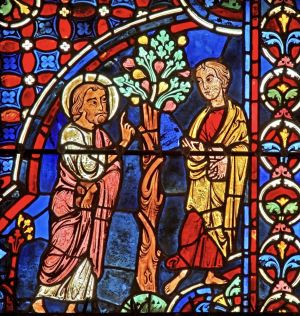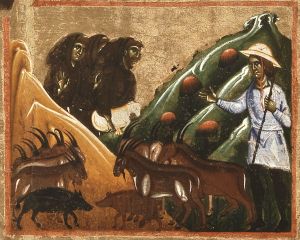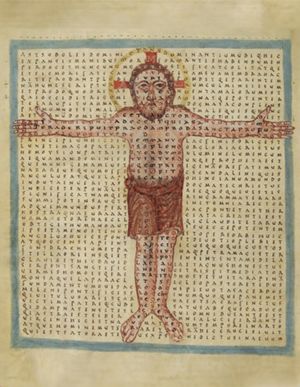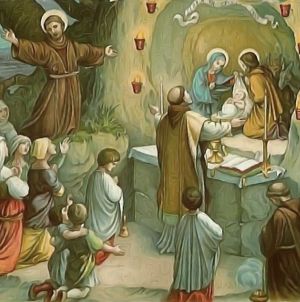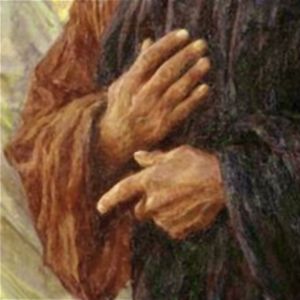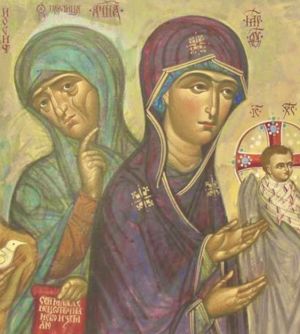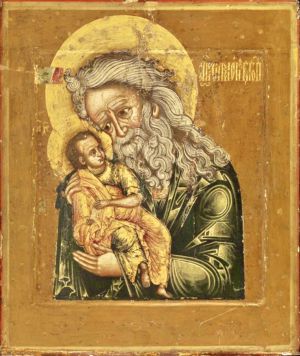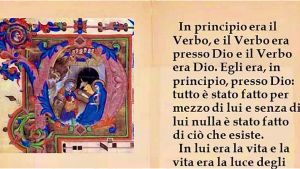
Teresa Girolami
Teresa Girolami è laureata in Materie letterarie e Teologia. Ha pubblicato vari testi, fra cui: "Pellegrinaggio del cuore" (Ed. Piemme); "I Fiammiferi di Maria - La Madre di Dio in prosa e poesia"; "Tenerezza Scalza - Natura di donna"; co-autrice di "Dialogo e Solstizio".
Changing lives, becoming Heralds. Nathanael and Francis
Jesus addresses Nathanael, a pious Israelite in whom there is no falsehood and committed to the profession of faith, who will see greater things than those already contemplated.
In the light of the Gospel episode, comparing the Franciscan Sources, we discover interesting passages.
Captivated by the newness of the Spirit, Francis changes his life and becomes a sign of contradiction for a world that had no desire to depart from the commonplace, from the path of traditions.
His free heart faces every contempt, in order to be loyal to Christ and his Gospel.
"Francis, the illiterate, the friend of simplicity, with an incomparably sincere and noble heart [...] how much this name of Francis befits him, to him who had a frank and noble heart more than any other" (FF 529).
Embracing his new state of life, one day, to the brigands who attacked him asking who he was, in sincerity, he replied:
«I am the herald of the great King; does that interest you?» (FF 346).
He can be considered 'an Israelite' in whom no falsehood dwells!
«You will see greater things than these!» (Jn 1:50)
Proper Feria of January 5 (Jn 1:43-51)
«For from his fullness we all received, and grace upon grace»
Francis was rapt in ecstasy as he meditated on the Beauty of a God who asks to be received in order to pour out his Love. The faith that animated him opened up new horizons and new proposals.
He was attracted by this 'humanised' God, who became Small so that man could live as a new creature.
Hence his search for contemplation, hidden spaces devoted to the wonder of the Mystery.
The Sources attest to the Grace in him:
"The Father used not to neglect any visitation of the Spirit: when it presented itself to him, he welcomed it and enjoyed the sweetness that was given to him, as long as the Lord allowed it.
Thus, if he gradually felt a few touches of the Grace while he was cramped with commitments or on a journey, he tasted that sweet manna on several and frequent occasions.
Even on the way he would stop, letting his companions go on, to enjoy the new visitation of the Spirit and not receive grace in vain" (FF 682).
(FF 682) "He tried with all care to hide the gifts of the Lord in the secret of his heart, because he did not want that, if they were an occasion of human glory, they should also be a cause of ruin for him [...] Turning then to himself he would say:
"If the Most High had granted such great graces to a thief, he would be more grateful than you, Francis!
For, as the Poor Man of Assisi wrote in his paraphrase to the Our Father:
"You reign in us through Grace and make us come into your kingdom, where the vision of you is without veils, the love of you is perfect, the communion of you is blissful, the enjoyment of you without end" (FF 269).
2nd Sunday after Christmas, (Jn 1:29-34) in part v.16
The Lamb and the lambs
«Behold the Lamb of God, the one who takes away the sin of the world».
Francis, the Minim, loved all animals, but he had a particular fondness for the lamb, because it reminded him of the Lamb of God sacrificed for our Redemption.
The mere thought of the Son of God sent to the slaughter moved him deeply, even to tears.
The Sources, an inexhaustible treasure chest of early life, offer us very significant pictures in this regard.
"He had a special tenderness for lambs, because in Scripture Jesus Christ is often and rightly compared to the meek lamb because of his humility.
For the same reason, his love and sympathy turned in a special way to all those things that could best depict or reflect the image of the Son of God" (FF 455).
"Another day, on a pilgrimage through the same March, with the same Brother Paul, who was very happy to accompany him, they came across a man who was bringing to market two lambs to sell, tied, bleating and dangling from his shoulders.
On hearing those bleats, the servant of God, greatly moved, approached them, stroking them, as a mother does with her crying children, with much compassion, and said to the master:
"Why do you torment my brother lambs, keeping them so tied and dangling?"
He answered: "I am taking them to the market and selling them: I need money". And Francis: "What will become of them?" And they: "The buyers will kill them and eat them".
On hearing this the Saint exclaimed: "Never let it be! Take my cloak as recompense and give me the lambs".
The man was well pleased with such a barter, for the cloak, which Francis had received on loan from a man that very day to shelter him from the cold, was worth much more than the two beasts.
But having received the lambs, the saint again realised the awkward problem: "How to provide for them?" and, on the advice of Brother Paul, he returned them to their master, advising him not to sell them, not to harm them in any way, but to keep and guard them with care" (FF 457).
Proper Feria of January 3 (Jn 1:29-34)
Voice of the Logos!
The Gospel passage presents the testimony of John, the Forerunner.
To those who ask him who he was, he presents himself as «Voice of one crying out in the wilderness» (Jn 1:23).
He baptised with water in order to prepare hearts for the One who comes and to whom the Baptist does not even feel worthy to untie the lace of his sandals.
The humble and strong testimony of the Precursor is echoed by that of Francis who, barefoot, announces the One who revolutionised his existence: Jesus - who baptised him in Holy Spirit and Fire.
Like John, the Poor Man perceives himself as unworthy and inadequate; but the Resurrection he has received has transformed him into a bold Herald of the Great King, for whom he wishes to prepare the way.
Jesus is the Way, but he sends before him heralds of the Kingdom, of the Word made flesh.
In the Sources we read:
"A great many, inflamed by his preaching, bound themselves to the new laws of penance, according to the form indicated by the man of God.
The servant of Christ established their form of life to be called the Order of the Brothers of Penance.
This new Order admitted all, clerics and laymen, virgins and spouses of either sex, because the way of penance is common to all who wish to strive for heaven" (FF 1073).
"He, in fact, had been elected by God, like a new Elijah, to be chariot and charioteer of spiritual men" (FF 1070).
Yes, Francis was and remains the Voice of one who, at that time, cried out in the desert of the world and continues to do so by his example, exhorting us to do our part as he did his.
«I am the voice of one who cries out in the wilderness. Straighten up the way of the Lord, as the prophet Isaiah said» (Jn 1:23)
Proper feria on 2 January (Jn 1:19-28)
Matrix of Franciscan work
«And they came with haste and found Mary and Joseph and the child lying in the manger [...] now Mary kept all these words and events, comparing them in her heart» (Lk 2:16, 19).
Francis was attracted to the figure of Mary, the Mother of God; She who, in profound humility, had been the grace-filled, virginal cradle of the blessed Son.
To her he dedicated praises, prayers and places in the community, placing the Order itself under her maternal protection.
In the Sources we read:
"He finally went to a place called the Portiuncula, in which there was a church dedicated to the Blessed Virgin: an ancient building, but then absolutely neglected and abandoned. When the man of God saw it thus abandoned, driven by his fervent devotion to the Queen of the world, he fixed his abode there, with the intention of repairing it. There he often enjoyed the visit of the Angels, as the name of the church itself, called St Mary of the Angels since antiquity, seemed to indicate. Therefore he chose it as his residence, because of his veneration for the Angels and his special love for the Mother of Christ [...].
This place, at the time of his death, he recommended to the brothers as the place dearest to the Virgin' (FF 1048).
And again: 'He often recalled to mind, weeping, the poverty of Jesus Christ and of his Mother, and affirmed that this is the queen of virtues, because one sees it shine so brightly, more than all the others, in the King of kings and in the Queen his Mother' (FF 1118).
To the Mother of God he gave his tribute of honour in the wonderful prayer, best known of all: the "Salutation to the Blessed Virgin Mary".
"Hail, Lady, holy Queen,/
holy Mother of God Mary,/
Thou virgin made Church [...].
Thou in whom was and is every fullness of grace and every good" (FF 259).
In Her he always repeated "May the Lord give you Peace" - wherever he went. Greeting revealed to him by the Most High.
The figure of Clare herself in the Sources is recalled as the "imprint of the Mother of God", and to Francis she recalled Mary's veracious freshness and her extraordinary identification of life and spiritual traits.
This Marian physiognomy, reflected in her disciple, helped the beginnings of the Order, giving her an essential role in the mission that united the two Poor of Assisi.
Mary Most Holy Mother of God, 1 January (Lk 2:16-21)
One of us
In his Prologue, John speaks to us of the Word made one of us, as a sign of God's gratuitous love and unwavering faithfulness towards us.
In his autograph writings, in his Letter to the Faithful, Francis emphasises:
"The Most High heavenly Father, through his holy angel Gabriel, announced this Word of the Father, so worthy, so holy and glorious, in the womb of the holy and glorious Virgin Mary, and from her womb he received the true flesh of our humanity and frailty.
He who was rich above all else, chose in this world, together with the most blessed Virgin, his mother, poverty" (FF 181-182).
And Clare in her Testament echoes this by saying:
"The Son of God became our Way; and this by word and example our blessed father Francis, a true lover and imitator of Him, showed and taught us" (FF 2824).
Yes, Francis contemplated the Word of God made flesh.
That is why the sacred live nativity scene was born, to see with the eyes of the body the hardships suffered by the God made one of us.
The Sources say:
"The Saint is there ecstatic before the crib, full of sighs, his spirit vibrating with compunction and ineffable joy" (FF 469).
«And we have contemplated his glory» (Jn 1:14).
Francis and Clare meditate and contemplate the Fullness of Light that has come to visit us as the rising sun that gives Hope to all men, those reborn of water and the Spirit.
31 December - VII day between the Octave of Christmas (Jn 1:1-18)
He praised infinitely
«He began to praise God and spoke of the Child to those who were waiting for the redemption of Jerusalem» (Lk 2:38)
Francis of Assisi considered Holy Christmas the feast of feasts. From there, in fact, had started the salvific parable of a merciful Father who wanted to "unroll like sackcloth" his divinity and humanity through the Gift of his Son.
That is why he infinitely praised God and spoke of the Child and the salvation He brought to all men at every opportunity, opportune and not opportune.
The depth of his prophetic spirit, received by Grace, made him capable of going beyond the immediate with refined inner insight.
In the Treasury of Sources we find particularly significant passages:
"The man of God stood before the manger, filled with pity, sprinkled with tears, overflowing with joy.
The holy sacrifice is celebrated above the manger and Francis, Christ's Levite, sings the holy Gospel.
He preaches to the people and speaks of the birth of the poor king and, in naming him, calls him, out of tenderness of love, the 'Child of Bethlehem'.
A virtuous and sincere knight who had left the scholastic militia and had become very attached to the man of God, Mr John of Greccio, claimed to have seen, inside the manger, a beautiful sleeping child, whom the blessed Francis, holding him with both arms, seemed to rouse from sleep.
This vision of the devout knight is rendered credible by the holiness of the witness, but it is also substantiated by the truth it indicates and confirmed by the miracles by which it was accompanied.
For the example of Francis, re-proposed to the world, had the effect of reawakening faith in Christ in numb hearts; and the hay from the manger, preserved by the people, had the power to heal sick beasts and drive away various other diseases.
Thus God glorifies his servant in all things and shows the efficacy of holy prayer with the probing eloquence of miracles" (FF 1186).
And Clare herself, the first plant of the Seraphic Father, in her stupendous Testament, while entrusting all her present and future daughters to the custody of the Lord Cardinal, expresses herself thus:
"For the love of that Lord, who poor at his birth was placed in a crib, poor lived on earth and remained naked on the cross, may he take care to make this little flock of his observe - this which the Most High Father, through the word and example of our blessed father Francis, generated in his holy Church precisely to imitate the poverty and humility of his beloved Son and of his glorious Virgin Mother [...]" (FF 2841).
Francis and Clare of Assisi: two stars of the firmament that illuminate the salvific Mystery of a God made flesh, who came to give Himself to every person and reality that claims salvation.
30 December - sixth day between the Octave of Christmas (Lk 2:36-40)
Sign of contradiction
Jesus, brought to the temple by Mary and Joseph, is greeted by the watchman Simeon as «a sign of contradiction [...] that the thoughts of many hearts may be revealed» (Lk 2:34-35).
Francis, in the time in which he lives and following the example of Christ, incarnates, as herald of the Great King, being a prophet and becoming a sign of contradiction, an indispensable condition for entering the Kingdom of God.
A sign of contradiction because he is the bearer of a new world, which leaves behind the remnants of the old one, far removed from the Love that came down from Heaven.
The Sources offer several examples of this being the germ of a new way of thinking.
We read:
"The man of God, wounded by his father's curses, chose a despised poor man as his father and said to him:
"Come with me, and I will give you part of my alms. When you see my father curse me, I will say to you: Bless me, O father! - And thou shalt make the sign of the cross upon me and bless me in his stead'.
As the poor man blessed him thus, the man of God said to his father:
"Do you not think that the Lord can give me a father who, against your curses, will cover me with blessings?".
Many of those who mocked him, seeing him endure all those tribulations with patience, were struck with awe and admiration" (FF 1423).
«Sign of contradiction [...] that the thoughts of many hearts might be revealed» (Lk 2:34-35)
And again, moved by the Spirit, he prophesied concerning St Clare and her sisters:
"There were also other people to help him with the restorations. Francis, radiant with joy, said in a loud voice, in French, to his neighbours and to those who passed by:
"Come, help me in these works! Know that a monastery of ladies will be built here, and by the fame of their holy life, our heavenly Father will be glorified throughout the church'.
He was animated by a prophetic spirit, and foretold what would actually happen.
It was precisely in the sacred place of San Damiano that the glorious and admirable Order of poor women and holy virgins was happily initiated by Francis, about six years after his conversion" (FF 1426).
"Many made fun of him, persuaded that he had given them the run-around; others were pitied to the point of tears, seeing that young man pass so quickly from a life of pleasures and caprices to an existence transfigured by the intoxication of divine love. But he, heedless of ridicule, gave fervent thanks to God" (FF 1421).
Yes, this child who became a bold young man, leaving the merry band, is transformed by Grace into that indisputable sign of contradiction that brings to light the truth that dwells in every heart, in the footsteps of Christ.
And, when the mission was accomplished, before his brothers, having himself placed on the bare ground, he reminded them that he had pledged to do his part and that the Lord would instruct them to do theirs.
29 December - fifth day between the Octave of Christmas (Lk 2:22-35)
New Family Persecuted
The Gospel of Matthew recounts the flight into Egypt of the Family of Nazareth due to Herod's persecution, who, in order to eliminate Jesus, had all the children in Bethlehem and the surrounding area killed.
This unique family was rejected from the moment it was formed, a model of perseverance in the face of trials.
Francis, God's jester, after Grace had made him a new creature, preferred the family given to him by the Father of mercies to his natural family.
In fact, without hesitation, in front of the bishop of Assisi and all those present, he stripped himself naked as a sign of abandonment, adding:
"Until now I have called you my father on earth; from now on I can say with complete confidence: Our Father, who art in heaven, because in Him I have placed all my treasures and all my trust and hope" (FF 1043).
This was an eloquent response to the old world that left him languishing in its pleasures, preferring to enjoy the sweetness he breathed at home in Nazareth.
Francis is in tune with the Holy Family: both in his personal life and in the community that developed around him.
In fact, he nourished himself with poverty and simplicity, growing in age, wisdom and grace before God and his beloved brothers.
He was submissive to every brother and sowed everywhere that extraordinary infused wisdom that came to him from above, pure and yielding.
Mary accompanied him everywhere.
He clung to her in every important event, so much so that he called her the Advocate of the Order, she who had made our brother the Lord of Majesty.
But no less so, Clare was part of the unique, silent Family of God - so fully that she received the gift (now ill and no longer able to go to church) of participating sensitively in the Christmas Liturgy.
The Father of Mercy and the entire Nazareth Family were with her.
The Sources inform us:
"At that hour of Christmas (1252), when the world rejoiced with the angels for the newborn Child, all the women went to Matins at the place of prayer, leaving the Mother alone, burdened by her infirmity.
And, having begun to think of the little Jesus and to grieve greatly that she could not participate in the singing of his praises, she sighed and said to him:
'Lord God, here I am, left here alone for you!'.
And suddenly, the wonderful concert taking place in the church of St Francis began to resound in her ears.
She heard the friars singing psalms in jubilation, followed the harmonies of the singers, and even perceived the sound of the instruments.
The place was not close enough to allow human perception of those sounds: either that solemn celebration was made divinely sonorous enough to reach her, or her hearing was strengthened beyond all human possibility.
Indeed, surpassing this miracle of hearing, she was even worthy of seeing the Lord's crib.
When her daughters came to her in the morning, Blessed Clare said:
'Blessed be the Lord Jesus Christ, who did not leave me alone when you abandoned me!
By the grace of Christ, I heard all the ceremonies that were celebrated last night in the church of St Francis" (FF 3212).
In the communities of Francis and Clare of Assisi, the spirit of the Family of Nazareth, experienced in suffering but also a place of genuine virtue, was alive and well. Clare, like another Mary, meditated in her heart on the mysteries of the Son of God, well understanding the apprehensions and dangers of flight. She herself, leaving the old world that pursued her, had known hardship and tribulation.
All these experiences helped her, on her journey as a Poor Woman, to relive the events of the family of Nazareth in depth.
«Now after Herod died, behold, an angel of the Lord appeared to Joseph in Egypt, saying, 'Rise, take the Child and his Mother, and go to the land of Israel'» (Mt 2:19-20a)
Holy Family of Nazareth (year A) (Mt 2:13-15, 19-23)
One of us. Prologue of Jn, Francis and Clare
Only through Christ can we converse with God the Father as children, otherwise it is not possible, but in communion with the Son we can also say, as he did, “Abba”. In communion with Christ we can know God as our true Father. For this reason Christian prayer consists in looking constantly at Christ and in an ever new way, speaking to him, being with him in silence, listening to him, acting and suffering with him (Pope Benedict)
Solo in Cristo possiamo dialogare con Dio Padre come figli, altrimenti non è possibile, ma in comunione col Figlio possiamo anche dire noi come ha detto Lui: «Abbà». In comunione con Cristo possiamo conoscere Dio come Padre vero. Per questo la preghiera cristiana consiste nel guardare costantemente e in maniera sempre nuova a Cristo, parlare con Lui, stare in silenzio con Lui, ascoltarlo, agire e soffrire con Lui (Papa Benedetto)
In today’s Gospel passage, Jesus identifies himself not only with the king-shepherd, but also with the lost sheep, we can speak of a “double identity”: the king-shepherd, Jesus identifies also with the sheep: that is, with the least and most needy of his brothers and sisters […] And let us return home only with this phrase: “I was present there. Thank you!”. Or: “You forgot about me” (Pope Francis)
Nella pagina evangelica di oggi, Gesù si identifica non solo col re-pastore, ma anche con le pecore perdute. Potremmo parlare come di una “doppia identità”: il re-pastore, Gesù, si identifica anche con le pecore, cioè con i fratelli più piccoli e bisognosi […] E torniamo a casa soltanto con questa frase: “Io ero presente lì. Grazie!” oppure: “Ti sei scordato di me” (Papa Francesco)
Thus, in the figure of Matthew, the Gospels present to us a true and proper paradox: those who seem to be the farthest from holiness can even become a model of the acceptance of God's mercy and offer a glimpse of its marvellous effects in their own lives (Pope Benedict))
Nella figura di Matteo, dunque, i Vangeli ci propongono un vero e proprio paradosso: chi è apparentemente più lontano dalla santità può diventare persino un modello di accoglienza della misericordia di Dio e lasciarne intravedere i meravigliosi effetti nella propria esistenza (Papa Benedetto)
Man is involved in penance in his totality of body and spirit: the man who has a body in need of food and rest and the man who thinks, plans and prays; the man who appropriates and feeds on things and the man who makes a gift of them; the man who tends to the possession and enjoyment of goods and the man who feels the need for solidarity that binds him to all other men [CEI pastoral note]
Nella penitenza è coinvolto l'uomo nella sua totalità di corpo e di spirito: l'uomo che ha un corpo bisognoso di cibo e di riposo e l'uomo che pensa, progetta e prega; l'uomo che si appropria e si nutre delle cose e l'uomo che fa dono di esse; l'uomo che tende al possesso e al godimento dei beni e l'uomo che avverte l'esigenza di solidarietà che lo lega a tutti gli altri uomini [nota pastorale CEI]
St John Chrysostom urged: “Embellish your house with modesty and humility with the practice of prayer. Make your dwelling place shine with the light of justice; adorn its walls with good works, like a lustre of pure gold, and replace walls and precious stones with faith and supernatural magnanimity, putting prayer above all other things, high up in the gables, to give the whole complex decorum. You will thus prepare a worthy dwelling place for the Lord, you will welcome him in a splendid palace. He will grant you to transform your soul into a temple of his presence” (Pope Benedict)
In the crucified Jesus, a kind of transformation and concentration of the signs occurs: he himself is the “sign of God” (John Paul II)
In Gesù crocifisso avviene come una trasformazione e concentrazione dei segni: è Lui stesso il "segno di Dio" (Giovanni Paolo II)
duevie.art
don Giuseppe Nespeca
Tel. 333-1329741
Disclaimer
Questo blog non rappresenta una testata giornalistica in quanto viene aggiornato senza alcuna periodicità. Non può pertanto considerarsi un prodotto editoriale ai sensi della legge N°62 del 07/03/2001.
Le immagini sono tratte da internet, ma se il loro uso violasse diritti d'autore, lo si comunichi all'autore del blog che provvederà alla loro pronta rimozione.
L'autore dichiara di non essere responsabile dei commenti lasciati nei post. Eventuali commenti dei lettori, lesivi dell'immagine o dell'onorabilità di persone terze, il cui contenuto fosse ritenuto non idoneo alla pubblicazione verranno insindacabilmente rimossi.


